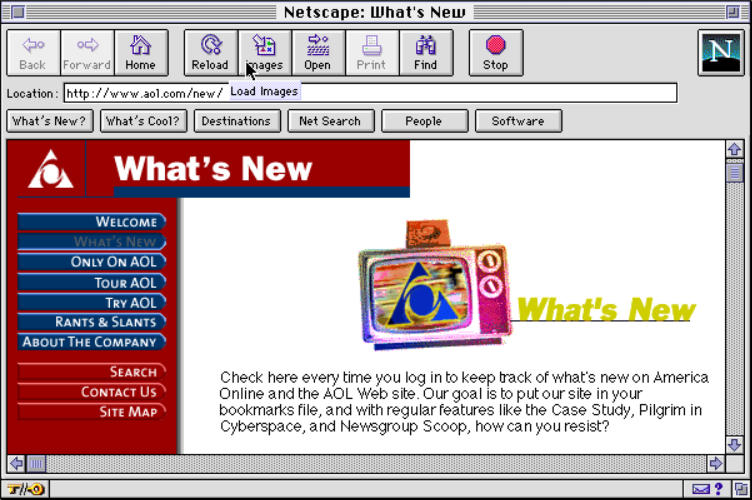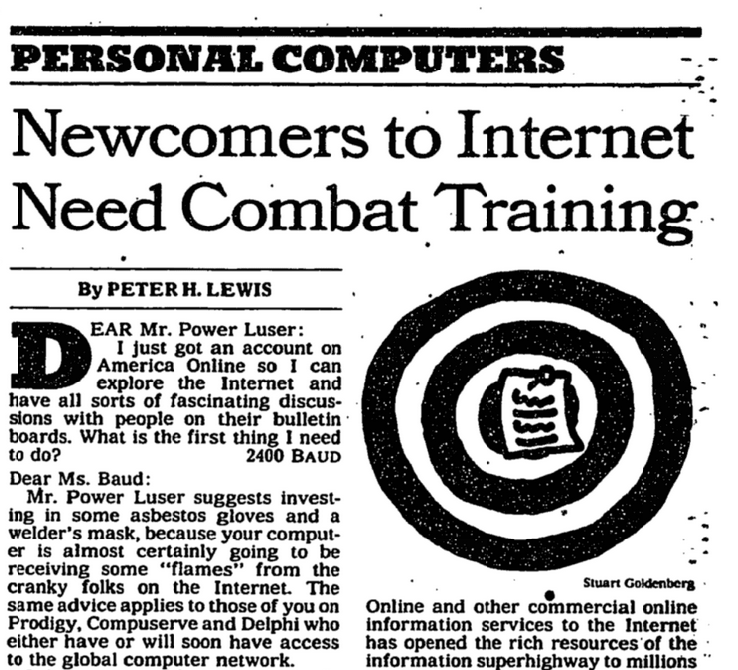Do we misremember Eternal September?
Kevin Driscoll / University of virginia

Eternal September (or “the September that never ended”) is one of the best-known tales of internet folklore. It takes place in the winter of 1993 when long-time denizens of USENET clashed with a cohort of newcomers from America Online (AOL). Unfamiliar with USENET norms and practices, the newbies seemed to overrun the network, clogging newsgroups with poorly formatted posts and repetitive questions. In response, exasperated USENET users took out the metaphorical flamethrowers, blasting America Online subscribers with caustic replies, blocking the “aol.com” domain, and venting in newsgroups like alt.aol-sucks. Within a few months, the flames died down but the golden days of the Net were over.
Or, so we are told.
The power of folklore is cultivated through repetition. Over the past two decades, the Eternal September story has become a touchpoint during periods of transition. Whenever the barriers are dropped from an online service, you are likely to hear someone reference “Eternal September.” From high schoolers posting on reddit during summer break to Android users joining Instagram, the Eternal September story validates the feeling of loss that accompany these changes in access and exclusivity.
Recently, Mastodon users invoked Eternal September in response to the sudden appearance of tens of thousands of Twitter users on the network. New ownership had taken hold of Twitter, journalists were being banned, and the future looked bleak.
The arrival of so many new users reminded some Mastodon users of the influx of AOL subscribers to USENET. One blogger wrote “Wake me up when September ends.” Another compared Twitter users to rowdy strangers crashing a house party. A thread on Hacker News titled “Mastodon’s eternal September begins?” attracted over three hundred replies. While some debated the resilience of Mastodon’s community, others argued that the underlying technology would prevent it from being overtaken. One poster was less sanguine about the changes: “Forget about [Mastodon’s] core culture: that’s gone now.”
At first glance, the so-called #TwitterMigration seemed like a classic case of an Eternal September. But, as critic Ernie Smith pointed out, Eternal September is all about gatekeeping. What lesson should we be taking from this story? Could we be misremembering the Eternal September?

As a provocation, here are three things that we often get wrong about Eternal September.
First, an error of fact: America Online did not open a gateway to USENET in September 1993. This inaccuracy is enshrined in the Jargon File and has been reproduced across the Web. For instance, I asked ChatGPT about the meaning of “Eternal September” and it responded:
“The term originated in the early days of the internet, specifically in September 1993, when AOL began offering new users access to Usenet…”
In fact, America Online acted with relative caution in expanding its “Internet Center.” The USENET gateway opened on February 28, 1994 after weeks of testing. Over the coming months, AOL quietly added support for Gopher and WAIS—the Web was not yet a priority—and waited until the early summer to alert the press.
Now, it might seem like a minor quibble but this chronological error reflects a second common misconception about Eternal September: America Online was not the only, nor the original, source of frustration for long-time USENET users. Indeed, the notion of a “September that never ends” was already in circulation long before the connection with AOL.
In January 1994, a post on alt.folklore.computers asked readers about the longest thread in the history of USENET. A few days later, Billy Chambless from the University of Southern Mississippi wondered if they should count the repetitive “september threads” that college freshman posted on the network each fall. “It’s moot now,” joked artist Dave Fischer, “September 1993 will go down in net.history as the September that never ended.”
No one in this thread mentioned America Online. Instead, posters recalled earlier panics that had accompanied the creation of gateways to FidoNet and CompuServe, both of which had been operational since the late 1980s. Evidently, the original significance of Eternal September was not about AOL alone but rather the overall expansion (and commercialization) of internet access. The special status afforded to “real” internet users was being eroded as the barriers to entry came down.
Of course, the historical association of AOL with Eternal September is not without merit. As historian Avery Dame-Griff recently detailed, AOL users were stuck with a clunky and costly interface. [1] Instead of downloading messages to read offline, AOL required users to stay online—and pay per minute—as they browsed the Net. Likewise, AOL made it difficult to properly quote previous messages in a reply and did not display new posts immediately, leading some users to repeatedly post duplicate messages. As Wendy Grossman summarized the situation: “AOLers weren’t (necessarily) stupid; they were software-disadvantaged.” [2]

Revisiting the details of this moment reveals a third problem with the standard Eternal September story: USENET of 1994 was hardly a utopia. By 1993, USENET had a bad reputation for being unfriendly to outsiders. When gateways opened to commercial networks, new users were treated as lower status than those with university affiliations. America Online subscribers were especially maligned.[3] The hierarchy of service providers was so widely recognized that college students worried about losing social status when their “.edu” accounts expired. Amid the hubbub of early 1994, one graduating senior posted, “Are you all going to hate me…when I am posting from delphi.com or aol.com?”
The hostility experienced by America Online subscribers was even covered in major U.S. newspapers. A reader of the Washington Post described AOLers being dismissed as “morons” and the “McDonald’s clientele.”[4] These class-based insults were underscored by the comparatively tepid treatment of users posting from CompuServe and Delphi—services aimed at business users and computer enthusiasts—who were positioned somewhere further up the hierarchy. As the letter writer signed off: “so much for the republic of the internet.”

The stories that we tell about the internet’s past shape our sense of what is possible for its future. In the usual telling of Eternal September, the arrival of new users is seen as a destructive force. USENET was forever changed. A vital online space was lost. Yet, these are tropes of toxic nostalgia, a longing for a (misremembered) past.
Instead, we might remember Eternal September as an instructive failure. In 1994, the people finding their way to the Net were more diverse in every way than those that had come before. When USENET failed to accommodate them, these newcomers formed communities elsewhere on the nascent Web. Eternal September was not an end but the beginning of a more open, inclusive internet.
Image Credits:
- America Online, “What’s New”, December 20, 1996, http://web.archive.org/web/19961220155121/http://www.aol.com/new/.
- Anonymous, “Roooooooooooaaaaaaaaaaaaaaaaaaarrrrrrrrr!!!!!!!!!!!!!!!!”, alt.online-services.aol, February 28, 1994, https://usenetarchives.com/view.php?id=alt.online-service&mid=PDJrdHY4cSRzdDJAcm1nMDEucHJvZC5hb2wubmV0Pg.
- Anonymous, “America Online…”, alt.best.of.internet, March 2, 1994, https://usenetarchives.com/view.php?id=alt.best.of.internet&mid=PDE5OTRNYXIyLjE0NTkyNy4xODU2OUB1bXIuZWR1Pg.
- Clipping from Peter H. Lewis, “Newcomers to Internet Need Combat Training,” New York Times, May 3, 1994, https://www.nytimes.com/1994/05/03/science/personal-computers-newcomers-to-internet-need-combat-training.html.
References:
- Avery Dame-Griff, “Herding the ‘Performing Elephants:’ Using Computational Methods to Study Usenet,” Internet Histories 3, no. 3–4 (October 2, 2019): 223–44, https://doi.org/10.1080/24701475.2019.1652456. [↩]
- Wendy Grossman, Net.Wars, 1st edition (New York: NYU Press, 1998). [↩]
- David Plotnikoff, “Newcomers: Learn How to Master Usenet,” Chicago Tribune (1963-1996), October 21, 1994, sec. Friday. [↩]
- Joseph Sobczyk, “There Goes the Network,” The Washington Post (1974-), October 13, 1994, sec. Style. [↩]